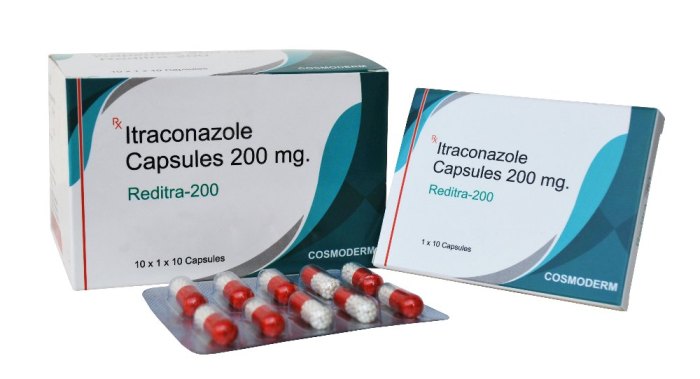Itraconazole capsules 200 mg stand as a potent antifungal medication, widely prescribed to combat a range of fungal infections. This comprehensive guide delves into the intricacies of this medication, exploring its mechanism of action, dosage recommendations, potential side effects, and clinical applications. From understanding its pharmacokinetic profile to navigating potential drug interactions, this exploration aims to provide a thorough understanding of itraconazole capsules 200 mg.
Itraconazole works by inhibiting the synthesis of ergosterol, a crucial component of fungal cell membranes. This disruption leads to the weakening and eventual death of fungal cells. The medication is available in various forms, including capsules, oral solutions, and intravenous formulations, allowing for flexibility in administration depending on the severity and location of the infection.
Adverse Effects and Drug Interactions: Itraconazole Capsules 200 Mg
Itraconazole capsules 200 mg, like many medications, can cause adverse effects and interact with other drugs. Understanding these potential issues is crucial for safe and effective treatment.
Common Adverse Effects
Common adverse effects of itraconazole are generally mild and usually resolve on their own.
- Gastrointestinal Issues: Nausea, vomiting, diarrhea, abdominal pain, and constipation are common. These symptoms can be managed by taking itraconazole with meals or by adjusting the dosage.
- Headache: Headache is a frequent side effect, often mild and transient. Over-the-counter pain relievers can be used to manage headache.
- Skin Rash: A mild skin rash can occur, usually resolving without treatment. If the rash is severe or accompanied by other symptoms, medical attention is necessary.
Serious Adverse Effects
While less common, itraconazole can cause serious adverse effects that require immediate medical attention.
- Hepatotoxicity: Liver damage is a potential risk, particularly in patients with pre-existing liver disease or those taking other medications that can affect the liver. Monitoring liver function tests is crucial, and discontinuation of itraconazole may be necessary if liver damage occurs.
- Cardiotoxicity: Itraconazole can prolong the QT interval on an electrocardiogram (ECG), increasing the risk of dangerous heart rhythm abnormalities. This is especially concerning in patients with pre-existing heart conditions or those taking other medications that can prolong the QT interval. Careful monitoring of ECG and heart function is essential.
- Hypersensitivity Reactions: Severe allergic reactions, such as anaphylaxis, can occur. Symptoms may include difficulty breathing, swelling of the face and throat, and a rapid heartbeat. Immediate medical attention is required.
Drug Interactions
Itraconazole is a potent inhibitor of the cytochrome P450 (CYP3A4) enzyme, which plays a vital role in metabolizing many medications. This inhibition can lead to increased blood levels of other drugs, potentially increasing their therapeutic effects or adverse effects.
It is crucial to obtain a thorough medication history from patients taking itraconazole, including over-the-counter medications, herbal supplements, and illicit drugs.
Significant Drug Interactions with Itraconazole, Itraconazole capsules 200 mg
| Interacting Drug | Mechanism of Interaction | Potential Consequences |
|---|---|---|
| Statins (e.g., simvastatin, atorvastatin) | CYP3A4 inhibition | Increased risk of myopathy (muscle damage) and rhabdomyolysis (muscle breakdown) |
| Calcium channel blockers (e.g., verapamil, diltiazem) | CYP3A4 inhibition | Increased risk of hypotension (low blood pressure) and bradycardia (slow heart rate) |
| Anti-arrhythmic drugs (e.g., amiodarone, quinidine) | CYP3A4 inhibition and QT interval prolongation | Increased risk of ventricular arrhythmias (irregular heartbeats) |
| Oral contraceptives | CYP3A4 inhibition | Decreased efficacy of oral contraceptives |
| Immunosuppressants (e.g., tacrolimus, cyclosporine) | CYP3A4 inhibition | Increased risk of immunosuppression-related side effects |
Monitoring and Management

Itraconazole therapy requires careful monitoring to ensure efficacy and safety. Regular assessments and laboratory tests are crucial for identifying potential adverse effects, managing drug interactions, and optimizing treatment outcomes.
Monitoring Parameters
It is essential to monitor patients receiving itraconazole therapy for potential adverse effects and drug interactions. Regular monitoring includes clinical evaluations and laboratory tests.
- Clinical Evaluations:
- Regularly assess the patient’s symptoms and response to therapy.
- Monitor for signs and symptoms of adverse effects, such as liver dysfunction, heart problems, and skin reactions.
- Evaluate the patient’s overall health status and any potential risk factors that could influence treatment outcomes.
- Laboratory Tests:
- Liver function tests (LFTs): Itraconazole can cause liver damage, so monitoring LFTs, including aspartate aminotransferase (AST), alanine aminotransferase (ALT), alkaline phosphatase (ALP), and bilirubin levels, is crucial.
- Complete blood count (CBC): Itraconazole can suppress bone marrow function, leading to anemia, leukopenia, or thrombocytopenia. Regular CBC monitoring helps detect these abnormalities.
- Electrocardiogram (ECG): Itraconazole can prolong the QT interval, increasing the risk of cardiac arrhythmias. ECG monitoring is essential, especially in patients with pre-existing heart conditions.
- Serum electrolyte levels: Itraconazole can affect electrolyte balance, particularly potassium and magnesium levels. Monitoring these electrolytes is important to prevent potential complications.
Managing Adverse Effects
Adverse effects associated with itraconazole therapy can be managed through various strategies, including dosage adjustments, supportive care, and discontinuation of the drug.
- Dosage Adjustments:
- If mild adverse effects occur, reducing the dosage or temporarily discontinuing the drug may be necessary.
- Adjusting the dosage based on individual patient characteristics, such as age, weight, and renal function, can help minimize adverse effects.
- Close monitoring of the patient’s response to dosage adjustments is crucial.
- Supportive Care:
- Symptomatic treatment, such as anti-emetics for nausea or antihistamines for skin reactions, can alleviate some adverse effects.
- In cases of severe adverse effects, hospitalization and intensive care may be required.
- Regularly monitoring vital signs, including heart rate, blood pressure, and temperature, can help identify potential complications.
- Discontinuation of Therapy:
- If adverse effects are severe or life-threatening, itraconazole therapy should be discontinued.
- Alternative antifungal medications may be considered depending on the underlying fungal infection.
- Close monitoring of the patient’s condition after discontinuation is essential to ensure recovery and prevent recurrence of the infection.
Future Directions and Research

Itraconazole, despite its long history and established efficacy, continues to be a subject of ongoing research. The goal is to improve its clinical utility, address existing limitations, and explore its potential in new therapeutic areas.
New Formulations and Delivery Systems
New formulations and delivery systems are being explored to enhance the bioavailability, improve tolerability, and simplify administration of itraconazole.
- Nano-formulations: Researchers are developing nano-sized itraconazole particles that can improve drug absorption and reduce gastrointestinal side effects.
- Targeted drug delivery: Encapsulation of itraconazole in nanoparticles or liposomes can facilitate targeted delivery to specific organs or tissues, such as the lungs or skin, enhancing efficacy and reducing systemic exposure.
- Controlled-release formulations: Controlled-release formulations are being investigated to provide sustained drug levels and reduce the frequency of administration. This could improve patient compliance and potentially reduce the risk of drug resistance.
Optimization of Efficacy and Safety
Ongoing research focuses on optimizing the efficacy and safety of itraconazole therapy.
- Combination therapy: Combining itraconazole with other antifungal agents can be beneficial in treating infections caused by resistant fungal strains or in cases where monotherapy is insufficient. Studies are evaluating the efficacy and safety of itraconazole in combination with newer antifungals, such as posaconazole or voriconazole, for specific fungal infections.
- Personalized medicine: Understanding the genetic and pharmacodynamic factors that influence itraconazole efficacy and toxicity is crucial for personalized medicine approaches. Research is underway to identify biomarkers that can predict drug response and adverse effects, enabling tailored treatment strategies.
Novel Applications and Emerging Fungal Infections
Itraconazole’s potential in treating emerging fungal infections and resistant strains is being investigated.
- Treatment of rare fungal infections: Itraconazole is being studied for its efficacy in treating rare and emerging fungal infections, such as mucormycosis and cryptococcosis, especially in immunocompromised patients.
- Combating antifungal resistance: The development of antifungal resistance is a growing concern. Researchers are investigating the potential of itraconazole in combination with other agents or in novel formulations to overcome resistance mechanisms.
Addressing Unmet Needs in Antifungal Therapy
Itraconazole’s ability to penetrate the central nervous system (CNS) is limited, posing a challenge in treating fungal infections of the brain and meninges.
- Improving CNS penetration: Research is exploring strategies to enhance itraconazole’s CNS penetration, potentially through novel formulations or co-administration with agents that facilitate CNS transport.
- New treatment options for fungal infections in specific populations: The use of itraconazole in pregnant women, children, and individuals with liver or kidney dysfunction is often limited due to safety concerns. Research is ongoing to develop safer and more effective treatment options for these vulnerable populations.
Itraconazole capsules 200 mg offer a valuable therapeutic option for a wide spectrum of fungal infections. Understanding its mechanism of action, appropriate dosage, potential adverse effects, and drug interactions is crucial for safe and effective treatment. This comprehensive exploration has shed light on the complexities of this medication, empowering individuals to make informed decisions regarding their health and well-being.
Itraconazole capsules 200 mg are an antifungal medication used to treat a variety of infections, including those affecting the skin, nails, and lungs. While itraconazole is effective against fungal infections, it’s important to remember that it’s not a treatment for viral infections like hepatitis C, which is often treated with medications like sofosbuvir. It’s crucial to consult with a healthcare professional to determine the most appropriate treatment for your specific condition.